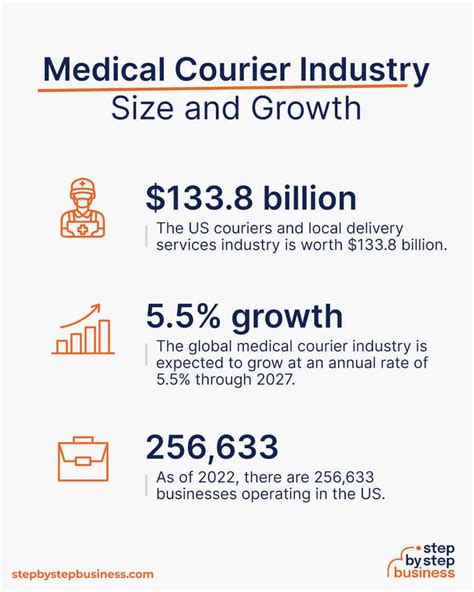Medical Courier Business Owner Salary

The medical courier industry is an essential and often overlooked segment of healthcare logistics. Medical couriers play a vital role in ensuring the safe and timely transportation of medical specimens, pharmaceuticals, and other sensitive materials between healthcare facilities, laboratories, and patients. For those interested in this industry, one of the most pertinent questions is: what can a medical courier business owner expect to earn? This article delves into the factors influencing the salary of a medical courier business owner, providing an in-depth analysis based on industry data and real-world experiences.
Understanding the Medical Courier Industry

The medical courier industry is a specialized field within the broader logistics and transportation sector. It requires a unique blend of skills, including an understanding of healthcare regulations, knowledge of safe transportation practices, and efficient route planning. Medical couriers are entrusted with critical tasks such as transporting blood samples, organs for transplantation, pharmaceuticals, and medical equipment. The industry is highly regulated to ensure patient safety and the integrity of medical specimens and medications.
The Role of a Medical Courier Business Owner
As a medical courier business owner, your role goes beyond managing the day-to-day operations of a transportation service. You are responsible for the overall success and sustainability of your business. This involves a range of tasks, including:
- Hiring, training, and managing a team of couriers.
- Maintaining a fleet of vehicles and ensuring they meet industry standards.
- Developing relationships with healthcare providers and laboratories to secure contracts.
- Implementing efficient routing and dispatch systems.
- Adhering to strict regulatory requirements.
- Marketing and promoting your business to expand your client base.
- Managing finances, including billing and payroll.
Factors Influencing Medical Courier Business Owner Salary

The salary of a medical courier business owner can vary significantly based on a multitude of factors. Understanding these variables is crucial for anyone considering entering this industry or for business owners looking to optimize their earnings.
Revenue Generation and Business Size
The primary determinant of a medical courier business owner’s salary is the revenue generated by the business. This, in turn, is influenced by several factors, including the size of the business, the number of clients, and the services offered.
For instance, a small medical courier business with a limited number of clients and a basic service offering may generate lower revenues, resulting in a more modest salary for the business owner. Conversely, a larger business with a diverse client base and a comprehensive service portfolio can potentially generate significant revenues, leading to a higher salary.
| Business Size | Estimated Annual Revenue |
|---|---|
| Small (1-5 vehicles) | $200,000 - $500,000 |
| Medium (6-15 vehicles) | $500,000 - $1,500,000 |
| Large (16+ vehicles) | $1,500,000 and above |

It's important to note that these revenue estimates are rough guidelines and can vary widely based on regional factors, competition, and the specific services offered.
Operating Costs and Profit Margins
In addition to revenue, the operating costs of a medical courier business significantly impact the business owner’s salary. These costs can include vehicle maintenance, fuel, insurance, staffing, and compliance with industry regulations. A well-managed business with efficient cost structures can achieve higher profit margins, leading to increased earnings for the business owner.
| Operating Cost Category | Average Percentage of Revenue |
|---|---|
| Vehicle Costs | 15-20% |
| Fuel | 5-10% |
| Staffing | 10-15% |
| Insurance | 5-8% |
| Compliance and Overhead | 5-10% |
These figures are estimates and can vary based on factors such as vehicle efficiency, staffing needs, and regional differences in fuel and insurance costs.
Industry Competition and Market Position
The level of competition within the medical courier industry can also affect a business owner’s salary. In highly competitive markets, the pressure to offer lower prices can impact profit margins and, consequently, the owner’s earnings. On the other hand, a business that establishes a unique selling proposition or dominates a particular market niche can command higher prices and earn more.
Growth and Expansion Strategies
Implementing effective growth strategies can significantly impact a medical courier business owner’s salary over the long term. This can include expanding the business’s geographical reach, diversifying services, or investing in technologies that enhance operational efficiency and customer service. For example, adopting digital dispatch systems or investing in electric vehicles can reduce operating costs and improve profitability.
Real-World Examples: Medical Courier Business Owner Salaries
To provide a clearer picture, let’s look at some real-world examples of medical courier business owners and their estimated annual salaries. These examples are based on industry data and actual business scenarios.
Small, Niche Medical Courier Business
John operates a small medical courier business specializing in the transportation of laboratory specimens within a limited geographical area. With a fleet of 3 vehicles, John’s business generates an estimated annual revenue of 300,000. After accounting for operating costs, which include vehicle maintenance, fuel, staffing, insurance, and compliance, John's estimated net profit is around 60,000, resulting in an annual salary of approximately $60,000.
Medium-Sized, Full-Service Medical Courier
Sarah owns a medium-sized medical courier business that offers a full range of services, including pharmaceutical deliveries, organ transports, and specimen couriering. With a fleet of 10 vehicles, Sarah’s business generates an estimated annual revenue of 1,200,000. After deducting operating costs, including higher staffing costs due to the 24/7 nature of some services, and investments in specialized equipment, Sarah's estimated net profit is around 240,000, resulting in an annual salary of approximately $240,000.
Large, Diversified Medical Logistics Company
Mike is the owner of a large medical logistics company that provides a wide range of services, including medical courier services, pharmaceutical distribution, and medical equipment rentals. With a fleet of 20 vehicles dedicated to courier services, Mike’s business generates an estimated annual revenue of 2,500,000. After managing costs associated with a large fleet, diverse service offerings, and a significant staffing requirement, Mike's estimated net profit is around 500,000, resulting in an annual salary of approximately $500,000.
Future Outlook and Strategies for Success
The medical courier industry is expected to continue growing as healthcare services expand and become more specialized. The COVID-19 pandemic has further emphasized the importance of efficient and reliable medical logistics. For business owners, this presents both challenges and opportunities.
Challenges and Opportunities
One of the primary challenges in the medical courier industry is maintaining a competitive edge while adhering to strict regulatory standards. However, this also presents an opportunity for business owners who can demonstrate a commitment to safety and quality. By investing in technology to improve efficiency and accuracy, and by training staff to meet the highest industry standards, medical courier business owners can position their businesses for long-term success.
Strategies for Business Growth
- Diversification: Expanding service offerings beyond traditional medical courier services can provide additional revenue streams. This could include offering specialty transportation services, such as hazardous material handling or organ transplantation, or diversifying into related fields like medical equipment rentals or pharmaceutical distribution.
- Technology Adoption: Implementing digital technologies can enhance operational efficiency, reduce costs, and improve customer service. This could include GPS tracking systems for vehicles, digital dispatch software, or online customer portals for real-time tracking and communication.
- Strategic Partnerships: Collaborating with other businesses or organizations in the healthcare sector can lead to mutually beneficial relationships. For example, partnering with a major hospital network could provide a steady stream of business and opportunities for expansion.
- Focus on Customer Service: In a highly regulated industry, customer service can be a key differentiator. By investing in customer service training for staff and implementing feedback systems, medical courier businesses can build strong relationships with their clients and gain a competitive advantage.
Conclusion

The medical courier industry presents an exciting and rewarding career path for those interested in logistics and healthcare. As a medical courier business owner, your earnings can vary significantly depending on a range of factors, including the size and scope of your business, your operating costs, and your ability to grow and adapt to market changes. By understanding these factors and implementing effective strategies, you can position your business for success and enjoy a rewarding career in this vital industry.
What are the key factors influencing the salary of a medical courier business owner?
+
The salary of a medical courier business owner is influenced by several factors, including revenue generation, operating costs, industry competition, and growth strategies. Higher revenues and efficient cost management can lead to increased earnings, while a competitive market and the need for continuous growth and adaptation can impact profit margins.
How can medical courier business owners increase their earnings potential?
+
Business owners can increase their earnings potential by expanding their client base, offering specialized services, and optimizing operational efficiency. Investing in technology, such as digital dispatch systems or electric vehicles, can reduce costs and improve profitability. Additionally, strategic partnerships and a focus on exceptional customer service can help businesses stand out in a competitive market.
What are some of the challenges faced by medical courier business owners?
+
Medical courier business owners face challenges such as maintaining a competitive edge while adhering to strict regulatory standards. The industry is highly regulated to ensure patient safety and the integrity of medical specimens and medications. Balancing the need for profitability with compliance requirements can be a significant challenge.
What opportunities exist for growth in the medical courier industry?
+
The medical courier industry is expected to continue growing as healthcare services expand and become more specialized. Business owners can tap into this growth by diversifying their service offerings, adopting new technologies, and forming strategic partnerships. Additionally, a focus on customer service and safety can help businesses gain a competitive advantage.



